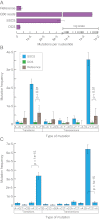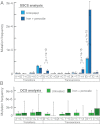Detection of ultra-rare mutations by next-generation sequencing
- PMID: 22853953
- PMCID: PMC3437896
- DOI: 10.1073/pnas.1208715109
Detection of ultra-rare mutations by next-generation sequencing
Abstract
Next-generation DNA sequencing promises to revolutionize clinical medicine and basic research. However, while this technology has the capacity to generate hundreds of billions of nucleotides of DNA sequence in a single experiment, the error rate of ~1% results in hundreds of millions of sequencing mistakes. These scattered errors can be tolerated in some applications but become extremely problematic when "deep sequencing" genetically heterogeneous mixtures, such as tumors or mixed microbial populations. To overcome limitations in sequencing accuracy, we have developed a method termed Duplex Sequencing. This approach greatly reduces errors by independently tagging and sequencing each of the two strands of a DNA duplex. As the two strands are complementary, true mutations are found at the same position in both strands. In contrast, PCR or sequencing errors result in mutations in only one strand and can thus be discounted as technical error. We determine that Duplex Sequencing has a theoretical background error rate of less than one artifactual mutation per billion nucleotides sequenced. In addition, we establish that detection of mutations present in only one of the two strands of duplex DNA can be used to identify sites of DNA damage. We apply the method to directly assess the frequency and pattern of random mutations in mitochondrial DNA from human cells.
Conflict of interest statement
The authors declare no conflict of interest.
Figures




Comment in
-
Sequence error storms and the landscape of mutations in cancer.Proc Natl Acad Sci U S A. 2012 Sep 4;109(36):14289-90. doi: 10.1073/pnas.1212246109. Epub 2012 Aug 21. Proc Natl Acad Sci U S A. 2012. PMID: 22912407 Free PMC article. No abstract available.
-
Über-accurate sequencing.Nat Methods. 2012 Oct;9(10):942-3. doi: 10.1038/nmeth.2189. Nat Methods. 2012. PMID: 23193579 No abstract available.
References
Publication types
MeSH terms
Substances
Grants and funding
LinkOut - more resources
Full Text Sources
Other Literature Sources
Molecular Biology Databases
Research Materials

